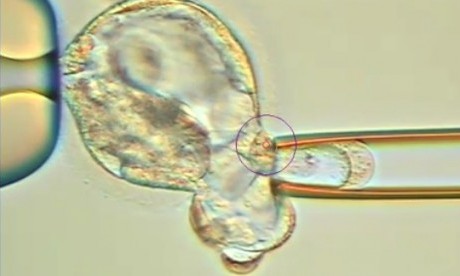A controversial procedure that lets would-be parents test embryos for certain genetic defects will soon be allowed in special cases in Germany. What does this mean for society?
Do people have the right to a healthy child? “No,” says Tina Stark, “they don’t.”
Her daughter Maya, an eight-month-old with strawberry blonde hair, is lying on the changing table in front of her. It’s Tuesday, and Stark has to replace the dressing on her daughter’s central venous catheter. She puts on a surgical mask, disinfects her hands and removes the adhesive bandage on Maya’s chest. “What we want is not a healthy child,” says Stark. “We want a child that doesn’t have this disease.”
Maya has congenital nephrotic syndrome. Her kidneys allow proteins to pass through her body unused. Nutrients flow through the child like water, which is why she receives infusions at night. Maya needs almost a dozen medications and nutrient solutions to survive. The placement and removal of the tubes takes four hours a day. The Starks have yet to find a nursing service that does this well.
Maya needs to gain weight. She needs to add about nine kilograms (20 lbs.) of body weight to receive a donor kidney, but only weighs seven-and-a-half kilos now. Maya won’t live much longer without a new kidney.
Stark, 35, is a teacher, and her husband Andreas, 36, is an anesthesiologist. When she became pregnant with Maya, they chose not to have prenatal screening procedures, such as a nuchal scan and amniotic fluid test. “We would have kept the child in any case, so we didn’t need to know anything,” say the Starks.
Today they are certain that the congenital disorder would not have been detected in a screening. Only one in 100,000 children in Germany is born with the rare syndrome. The outlook for the Starks, however, is completely different. If they have another baby, there is a one-in-three chance that it will have the disease, which is why they recently visited the Medical Genetics Center (MGZ) in Munich. Continue reading
Sources
- Spiegel Online
- Image: RMA of Connecticut
